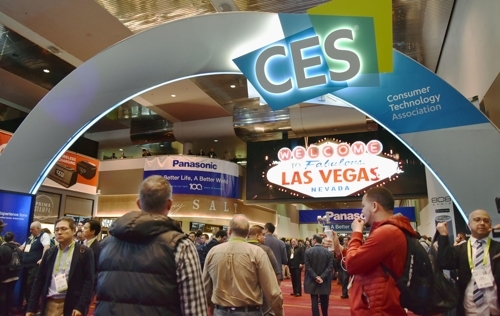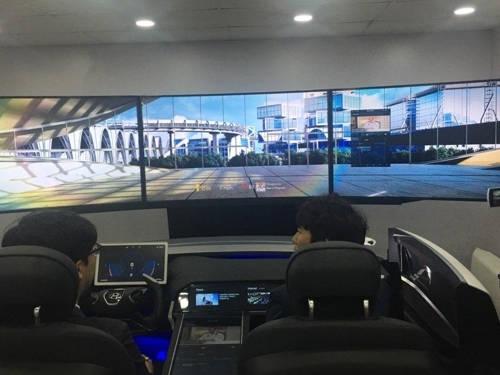LAS VEGAS -- The biggest tech event of the year, the Consumer Electronics Show, ended its four-day run Friday with almost 4,000 companies around the globe showcasing their latest, coolest technologies to envision the future of smart cities.
This year’s show, however, would be difficult to define by any one keyword, as tech hot shots from around the world have shown off products and technologies more diverse than ever before in the areas of consumer electronics, smart appliances, self-driving automobiles, sports, health care, games and public security based on the 5G network, artificial intelligence and Internet of Things technologies.
Korean tech giants Samsung, LG and Hyundai Motor have similarly unveiled their visions and the new technologies apparently beyond their traditional mainstays -- devices and cars.

Samsung and Harman demonstrate the “digital cockpit” smart electronics solution at the Las Vegas Convention Center during this year’s Consumer Electronics Show. (Yonhap)
Samsung defined the key trend of future society as “connectivity powered by artificial intelligence” in front of 1,500 participants from media and the industry on Monday, a day before the show officially kicked off. The firm also announced its extensive Internet of Things platform “Smart Things,” which connects with its 40 partner companies and up to 370 devices with the aim of an open ecosystem.
LG introduced its new artificial intelligence brand LG ThinQ that can be integrated into all of its products and services. LG ThinQ allows users to communicate with appliances via voice command and enables appliances to communicate with each other. For instance, automobiles and refrigerators can work together to order groceries when needed.
Hyundai Motor announced artificial intelligence platform “cockpit” to connect drivers and cars. The cockpit is the integrated technologies of in-vehicle personalization technologies, voice recognition technologies and biometric signal analysis technologies.

Visitors browse booths at CES 2018, which kicked off Tuesday in Las Vegas. (Yonhap)
Alongside Samsung, LG and Hyundai, 200 Korean firms joined the event showcasing their latest technologies based on the 5G network, artificial intelligence and Internet of Things -- all the big buzzwords in the global tech industry.
“Korea has had a strong presence at CES over the past few years. Compared to last year, we are expecting almost twice as many exhibitors from the nation at the show. We are encouraged by the strong support of tech innovation across the public and private sectors in Asia,” Gary Shapiro, president and CEO of the Consumer Technology Association, told The Korea Herald.
Other global tech firms, including Sony, Panasonic, Huawei, Hisense and Haier, have also showcased their products and technologies in the areas of games, software, travel, sports, fashion and health care to make the venue truly diverse.
Another highlight of this year’s show is convergence among tech firms, automakers and vehicle-related firms.

A Hyundai employee demonstrates the firm’s artificial intelligence-powered driver’s seat at the CES 2018. (Yonhap)
Samsung and Harman jointly demonstrated AI-powered an in-vehicle infotainment system integrated into Italian luxury automobile Maserati. They also plan to demonstrate self-driving automobiles during next year’s CES. Hyundai and the US driverless automobile startup, Aurora, announced a joint project to commercialize “Level 4” autonomous driving technologies by 2021.
Chipmaker Intel introduced a platform to develop “Level 4” and “Level 5” self-driving cars with Israeli tech firm Mobileye, while Mercedes Benz announced its in-vehicle infotainment system in partnership with chipmaker Nvidia to allow drivers to control cars simply with “Hey, Mercedes.”
The coolest technologies, however, were briefly overshadowed by an hourlong blackout that hit major areas of the show Wednesday afternoon. The outage caused by rain lasted about two hours and stopped the exhibition of hundreds of the tech firms, including Samsung, LG, Intel, Qualcomm, Toshiba, Sony and Panasonic. Their AI and IoT devices were turned off and had to wait a few hours to get back on track even after power returned.
By Shin Ji-hye/Korea Herald correspondent (
shinjh@heraldcorp.com)








